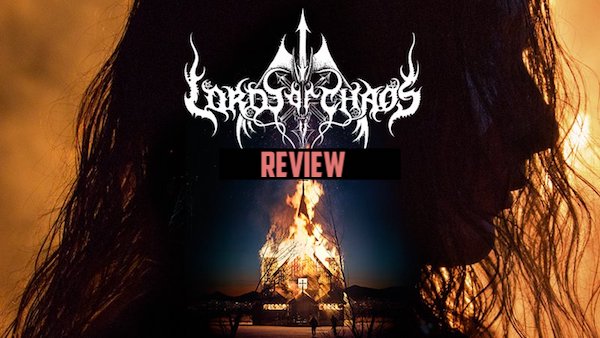Lords Of Chaos: The Mayhem Of Mayhem
Writer/director Jonas Åkerlund (Spun) gives Norway’s black metal godfather’s Mayhem the I, Tonya treatment. “Based on truth… lies and what actually happened” and more concerned with the figures behind the music than it is with the music itself, Åkerlund wipes his characters of their corpse paint and deglamorizes the black metal scene as he searches for the answer behind why events turned as ugly as they did. Though not perfect by any stretch, Lords of Chaos is an intriguing biopic full of church burning, satan worshipping, and murder.
The film follows the story of the Black Circle, a group of young Norwegians who revolutionized the heavy metal scene in the early 90s — most notably the band Mayhem and its guitarist Euronymous (Rory Curkin), and Burzum's Varg Vikernes (Emory Cohen) — as they launch Norwegian back metal in Oslo in the 1980s. Their quest leads them down a dark path that results in a very violent outcome.
One of the things I was worried about with the film was that it would be very cringy, and to a certain degree there’s an element of that; however, I found Lords of Chaos less cringe-inducing than I had initially anticipated. Sure, the voiceover (which is also featured in the trailer above) is majorly hard to stomach and some of the film’s presentation rings a bit hollow, but overall, I found there to be more pros than cons.
Considering that Åkerlund was the former drummer of Sweden’s Bathory, who was itself a slight influencer on the black metal scene and Mayhem in particular, I think he’s the perfect person to tell this particular story. There’s some issues with the film, like American actors playing Norwegians with no accent and some characters being pretty skewed from their real-life counterpart, and it’s aimed more at the uninitiated outsiders more than true Mayhem or black metal fans, which admittedly is odd, but for the most part, I love what he’s done here.
Far and away Lords of Chaos’ biggest win is showing the humanity behind the self-perpetuated “hard” veneer of the story’s central figures. Åkerlund treats his characters as men before monsters, but also never shies away from the monstrous side of things, and he depicts the Black Circle as a bunch of dumb, spoiled kids who took a vision way too far. It’s also, interestingly, a film devoid of adult figures, yet there’s an adult presence that lingers over everything; money from Varg’s mother was funneled into Euronymous’ efforts, and Euronymous’ father put up the money for his record store Helvete ("Hell"), which he and several of the Black Circle’s members also lived in.
More often than not, filmic depictions of metal and metalheads tend to idolize death, destruction, and murder — and the film does, in a way, idolize these things, but only in the sense that these things are falsely idolized by its characters; however, when the characters in Lords of Chaos are confronted with the death and murder they naively thought were hip symbols of metal, they no longer think of them as cool or funny — and this is important. Åkerlund’s portrayal of violence is, for good reason, hard to watch, and he takes the time to show how its fallout would undoubtedly affect those who came in contact with it or participated. Progressively, as things move on, the tone shifts from less playful to more grave.
I really like that Åkerlund shows the self-conscious glam aspect of the scene’s famed aesthetic, featuring many scenes in which the characters gaze into their reflection to ensure that their look is just right. I also really like how the film provides a glimpse of what Norway was like before black metal was introduced/invented — a land full of hokey, old world traditions and christianity — and how eventual rebellion from its set traditions was inevitable.
From my understanding of the story and its facts, Lords of Chaos is a mostly true account of the events that made Norwegian black metal a sensation. However, its nearly fatal misstep is by not consulting with Varg Vikernes, who is, in the documentary about Norwegian black metal Until the Light Takes Us, more jovial and soft spoken that his filmic depiction.
While the film attempts to give Mayhem’s story some answers, it does so with a bit too much finality, missing out on the opportunity to play with the story’s contradicting parts like I, Tonya. Frankly, I was a little surprised there weren’t any title cards at the end to give information on Varg’s outcome — he went to jail for the murder of Euronymous and was released after only 6 years — or how the events influenced the genre. Still, despite its many imperfections, it’s a story so unbelievable, you gotta check it out.
Recommendation: This may disgust the true metal heads, but to the uninitiated (which it was made for), it’ll likely be informative, engaging, and entertaining.
Rating: 3 burning churches outta 5.
What do you think? Did you cringe while watching Lords of Chaos, or did you find it effective? We want to know. Share your thoughts and feelings in the comments section below, and as always, remember to viddy well!



